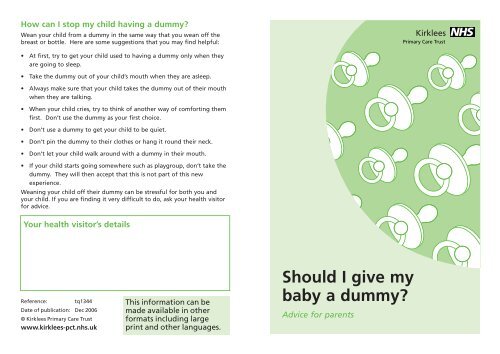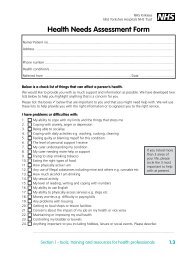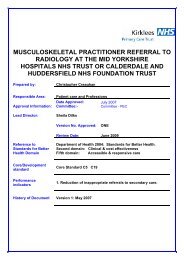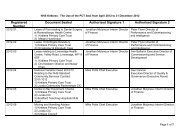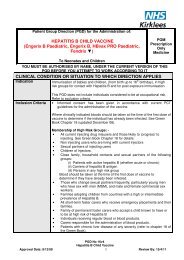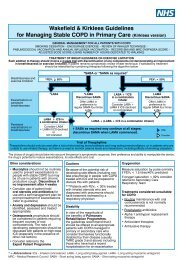Should I give my baby a dummy? - NHS Kirklees
Should I give my baby a dummy? - NHS Kirklees
Should I give my baby a dummy? - NHS Kirklees
Create successful ePaper yourself
Turn your PDF publications into a flip-book with our unique Google optimized e-Paper software.
How can I stop <strong>my</strong> child having a dum<strong>my</strong>?Wean your child from a dum<strong>my</strong> in the same way that you wean off thebreast or bottle. Here are some suggestions that you may find helpful:• At first, try to get your child used to having a dum<strong>my</strong> only when theyare going to sleep.• Take the dum<strong>my</strong> out of your child’s mouth when they are asleep.• Always make sure that your child takes the dum<strong>my</strong> out of their mouthwhen they are talking.• When your child cries, try to think of another way of comforting themfirst. Don’t use the dum<strong>my</strong> as your first choice.• Don’t use a dum<strong>my</strong> to get your child to be quiet.• Don’t pin the dum<strong>my</strong> to their clothes or hang it round their neck.• Don’t let your child walk around with a dum<strong>my</strong> in their mouth.• If your child starts going somewhere such as playgroup, don’t take thedum<strong>my</strong>. They will then accept that this is not part of this newexperience.Weaning your child off their dum<strong>my</strong> can be stressful for both you andyour child. If you are finding it very difficult to do, ask your health visitorfor advice.Your health visitor’s detailsReference:tq1344Date of publication: Dec 2006© <strong>Kirklees</strong> Primary Care Trustwww.kirklees-pct.nhs.ukThis information can bemade available in otherformats including largeprint and other languages.<strong>Should</strong> I <strong>give</strong> <strong>my</strong><strong>baby</strong> a dum<strong>my</strong>?Advice for parents
<strong>Should</strong> I <strong>give</strong> <strong>my</strong> <strong>baby</strong> a dum<strong>my</strong>?<strong>Should</strong> I <strong>give</strong> <strong>my</strong> <strong>baby</strong> a dum<strong>my</strong>?<strong>Should</strong> I <strong>give</strong> <strong>my</strong> <strong>baby</strong> a dum<strong>my</strong>?Babies are often <strong>give</strong>n dummies as a comfort or to help them go to sleep.There is nothing wrong with this and the occasional use of a dum<strong>my</strong> hashelped to keep many a harassed parent sane!If you do <strong>give</strong> your child a dum<strong>my</strong> try getting one with an orthodonticteat as these are designed to cause the least damage to the growth ofyour child’s teeth.What about when <strong>my</strong> child is older?If your child carries on using a dum<strong>my</strong> when they are a toddler it canbecome a difficult habit to break.Ask yourself the following questions:• Does <strong>my</strong> child always carry a dum<strong>my</strong>?• Does <strong>my</strong> child have the dum<strong>my</strong> in their mouth during the day?• Does <strong>my</strong> child have more than one dum<strong>my</strong>?• Does <strong>my</strong> child try to talk with the dum<strong>my</strong> in their mouth?• Are <strong>my</strong> child’s teeth growing evenly or are the top ones shorter thanthe others?• Does <strong>my</strong> child nod or shake his head, point or gesture, rather than takethe dum<strong>my</strong> out of their mouth to talk?• Are there some speech sounds that <strong>my</strong> child is unable to say?• Does <strong>my</strong> child have more difficultly making herself understood thantheir friends do?If you answered "yes" to more than one of these questions this maymean that your child’s dum<strong>my</strong> is becoming a problem.What problems can there be if <strong>my</strong> child uses adum<strong>my</strong> a lot?It is important to remember that it is the length of time a dum<strong>my</strong> is usedand how often during the day, rather than the dum<strong>my</strong> itself which cancause problems.If the habit is broken early, the child will not miss it and will not be ableto ask for it! Older children are more persuasive and persistent.The following problems can be associated with prolonged dum<strong>my</strong>sucking:Talking• Very young babies make cooing and babbling sounds as theyexperiment in preparation for their first words. Using a dum<strong>my</strong>frequently in the early months restricts the amount of time they can dothis.• Dum<strong>my</strong> sucking babies are often more contented and don’t activelyseek as much stimulation from their environment.• Talking with the dum<strong>my</strong> in their mouth stops the child’s tongue fromgetting into the right position for speaking and faulty speech patternsmay develop.Teeth• Continual use of a dum<strong>my</strong> once the teeth have started to appear canmake the teeth uneven. Sometimes there is an open bite where thefront teeth cannot close together. This can affect speech sounds.• If you dip the dum<strong>my</strong> in sugary drinks or food such as jam or honeythe teeth will decay.


